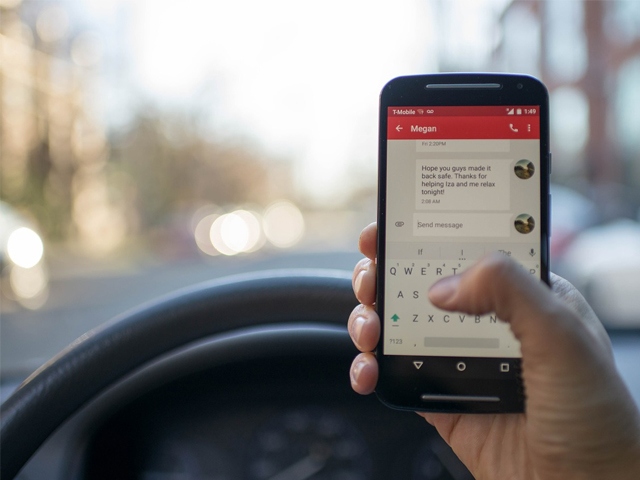Driving while using phones judgement could force laws to change
Date published: 01 August 2019

Laws around driving with your phone could change after the judgement
Laws governing mobile phone use while driving could be torn up and re-written after the High Court issued a landmark judgement.
Legislation governing mobiles and motoring currently says an offence is committed if you're using your phone for "interactive telecommunication" while at the wheel.
Because the laws were written way back in 2003, before the first iPhones appeared, that essentially means using your phone for sending or receiving phone calls or texts.
But now lawyers have successfully argued that using your phone's camera while driving does NOT constitute "interactive telecommunication".
And the 'loophole' could apply to a whole host of scenarios, from using certain apps to skipping music tracks on iTunes.
The case being heard centred around builder Ramsey Barreto, who was convicted of driving while using a hand-held phone after police spotted him filming while driving past a crash.
His conviction was later overturned at Isleworth Crown Court before the Director Of Public Prosecutions challenged the decision in the High Court.
But now the High Court has sided with Barreto - in a decision that could spark a frantic race to tighten legal loopholes.
His solicitor Emma Patterson successfully argued the case - she said: "We are absolutely delighted with the outcome of this case.
"We have been arguing for many years that the legislation in relation to the offence of using a handheld mobile phone whilst driving a motor vehicle has failed to keep pace with the evolution of smart phones.
"The increasing multi-functionality of smart phones was, in fact, making a mockery of the law.
"We ended up with a situation where you could hold a Casio calculator performing mathematical calculations whilst driving and you would not be committing a mobile phone offence, whereas doing exactly the same thing on the calculator app on a smart phone, according to the way the Police or Crown Prosecution Service were applying the law, meant you would automatically be committing an offence warranting six points and a hefty fine.
"When the fixed penalty for using a mobile phone was increased from three to six points and the fixed penalty fine was increased from £100 to £200, we argued that Parliament should have seized the opportunity to update the legislation in general, not just the penalties.
"It seemed like a missed opportunity at the time. A quick fix.
"This is not a loophole argument. This is simply the correct application and understanding of the law as it currently stands."
Patterson says drivers who use their phones at the wheel may still be committing an offence of driving without due care and attention, or dangerous driving, 'if the standard of driving falls below that expected of a careful and competent driver'.
She adds: "We have always said that it is dangerous to interact with any type of device whilst driving a motor vehicle on a road and it was always open to the Police or Prosecution to pursue an allegation of driving without due care and attention or perhaps even dangerous driving.
"That was never the issue.
"The issue was that the law as it stood created anomalies and confusion.
"We now have the clarity in this judicial precedent to match what we had been correctly advocating on behalf of our clients for many, many years."
UK motoring expert Francis Noakes, of the Get Licensed Driving School, urged lawmakers to revisit the legislation as a 'matter of urgency'.
He said: "Driving whilst using a mobile phone, contrary to section 110 of the Road Vehicles Regulations 1986, warrants six points on your licence and a standard fine of £200, with a maximum fine of up to £1000.
"But what this test case shows is that, as it stands, prosecutions are far from straightforward and an offence is difficult to prove.
"The law is designed to prohibit active involvement in communication whilst driving.
"If you use an App that allows you to communicate with other people, you're committing an offence.
"But there's now a massive grey area. Is checking the weather on an app an offence? Can you make voice memos in your phone with impunity?
"When it comes to road safety, we simply can't allow for any uncertainty to exist. I'd urge lawmakers to revisit and tighten the legislation as a matter of urgency."
Patterson, meanwhile, says that as the law stands, it'll fall to prosecutors to prove a driver was engaged in "interactive telecommunication" before an offence has been committed.
She adds: "In May this year David Beckham was banned from driving for six months for using his mobile phone while behind the wheel.
"In this case, the offence was brought to light because a member of the public photographed Mr Beckham holding a phone as he drove in slowly moving traffic.
"But was Mr Beckham engaged in "interactive telecommunication"? We don't know because the prosecuting lawyers did not present evidence to prove that offence.
"Because of this new test case, historic cases such as Mr Beckham's can be viewed in a completely different light.
"And he's not the only one who might feel aggrieved."
Most Viewed News Stories
- 1Changes to Oldham regeneration project will cost additional £7m
- 2Controversial scheme on greenbelt given planning permission
- 3A third of Oldham is worse off than six years ago, say government statistics
- 4Oldham charity which has helped 20,000 families up for national accolade
- 5Tributes paid as Saddleworth mum and breast cancer campaigner Jo passes away, aged 56




